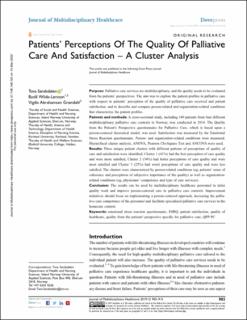Patients’ Perceptions Of The Quality Of Palliative Care And Satisfaction – A Cluster Analysis
Peer reviewed, Journal article
Published version
Permanent lenke
http://hdl.handle.net/11250/2646857Utgivelsesdato
2019Metadata
Vis full innførselSamlinger
Sammendrag
Purpose: Palliative care services are multidisciplinary, and the quality needs to be evaluated from the patients’ perspectives. The aim was to explore the patient profiles in palliative care with respect to patients’ perception of the quality of palliative care received and patient satisfaction, and to describe and compare person-related and organization-related conditions that characterize the patient profiles. Patients and methods: A cross-sectional study, including 140 patients from four different multidisciplinary palliative care contexts in Norway, was conducted in 2014. The Quality from the Patient’s Perspective questionnaire for Palliative Care, which is based upon a person-centered theoretical model, was used. Satisfaction was measured by the Emotional Stress Reaction questionnaire. Person- and organization-related conditions were measured. Hierarchical cluster analysis, ANOVA, Pearson Chi-Square Test and ANCOVA were used. Results: Three unique patient clusters with different patterns of perceptions of quality of care and satisfaction were identified; Cluster 1 (41%) had the best perception of care quality and were more satisfied, Cluster 2 (34%) had better perceptions of care quality and were most satisfied and Cluster 3 (25%) had worst perceptions of care quality and were less satisfied. The clusters were characterized by person-related conditions (eg, patients’ sense of coherence and perceptions of subjective importance of the quality) as well as organization-related conditions (eg, physicians’ competence and type of care services). Conclusion: The results can be used by multidisciplinary healthcare personnel to tailor quality work and improve person-centered care in palliative care contexts. Improvement initiatives should focus on implementing a person-centered approach, increasing the palliative care competence of the personnel and facilitate specialized palliative care services in the homecare context. Keywords: emotional stress reaction questionnaire, ESRQ, patient satisfaction, quality of healthcare, quality from the patients’ perspective specific for palliative care, QPP-PC
